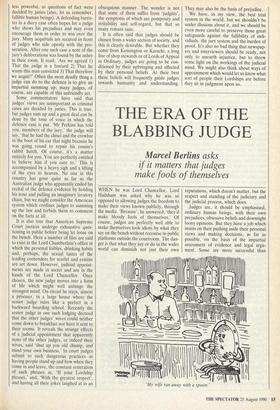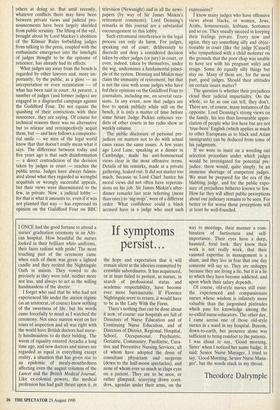THE ERA OF THE BLABBING JUDGE
Marcel Berlins asks
if it matters that judges make fools of themselves
WHEN he was Lord Chancellor, Lord Hailsham was asked why he was so opposed to allowing judges the freedom to make their views known publicly, through the media. 'Because', he answered, 'they'd make bloody fools of themselves.' Of course, judges are perfectly well able to make themselves look idiots by what they say on the bench without recourse to public platforms outside the courtroom. The dan- ger is that what they say or do in the wider world can diminish not just their own reputations, which doesn't matter, but the respect and standing of the judiciary and the judicial process, which does.
Judges are, it should be emphasised, ordinary human beings, with their own prejudices, obsessive beliefs and downright loony opinions. But they have a job which insists on their pushing aside their personal views and making decisions, as far as possible, on the basis of the impartial assessment of evidence and legal argu- ment. Some are more successful than
'My wife ran away with a spoon. others at doing so. But until recently, whatever conflicts there may have been between private views and judicial pro- nouncements have been largely shielded from public scrutiny. The lifting of the veil, brought about by Lord Mackay's abolition of the Kilmuir Rules forbidding judges from talking to the press, coupled with the enthusiastic emergence into the limelight of judges thought to be the epitome of reticence, has already had its effects.
What judges say away from the bench is regarded by other lawyers and, more im- portantly, by the public, as a gloss — an interpretation or even recantation — of what has been said in court. At present, a number of judges (and former judges) are engaged in a disgraceful campaign against the Guildford Four. Do not equate the quashing of their convictions with their innocence, they are saying. Of course for technical reasons there was no alternative but to release and retrospectively acquit them, but — and here follows a conspirato- rial smile — we men of the legal world know that that doesn't really mean what it says. The difference between today and five years ago is that such disinformation — a direct contradiction of the decision taken by judges in court — reaches the public arena. Judges have always fulmin- ated about what they regarded as wrongful acquittals or wrongly successful appeals, but their views were disseminated to the few, in private. Now, a judicial lobby for that is what it amounts to, even if it was not planned that way — has expressed its opinion on the Guildford Four on BBC television (Newsnight) and in all the news- papers (by way of Sir James Miskin's retirement comments). Lord Denning's remarks in this journal are a substantial encouragement to this lobby.
Such extramural interference in the legal process can only do harm. For judges, speaking out of court, deliberately to discredit and deny a considered decision taken by other judges (or jury) in court, or even, indeed, taken by themselves, under the wig, undermines a fundamental princi- ple of the system. Denning and Miskin may claim the immunity of retirement, but that is not the case with some judges who have fed their opinions on the Guildford Four to journalists, including me, on several occa- sions. In any event, now that judges are free to speak publicly while still on the bench, it is only a matter of time before some future Judge Pickles criticises ver- dicts of other courts in his radio show or weekly column.
The public disclosure of personal pre- judices on matters not to do with actual cases raises the same issues. A few years ago Lord Lane, speaking at a dinner in Cambridge, made his anti-homosexual views clear in the most offensive terms. Details of his remarks, made at a private gathering, leaked out. It did not matter too much, because as Lord Chief Justice his moral views did not often have repercus- sions on his job. Sir James Miskin's after- dinner remarks last year referring (more than once) to `nig-nogs', were of a different order. What confidence could a black accused have in a judge who used such expressions?
I know many judges who have offensive views about blacks, or women, Jews, Arabs, homosexuals, lesbians, Scotsmen and so on. They usually succeed in keeping their feelings private. Every now and again, they say something silly and objec- tionable in court (like the judge [Cassell] who sympathised with a child molester on the grounds that the poor chap was unable to have sex with his pregnant wife) and resign. Some do equally silly things but stay on. Many of them are, for the most part, good judges. Should their attitudes on certain issues matter?
The question is whether their prejudices cloud their judicial impartiality. On the whole, so far as one can tell, they don't. There are, of course, many instances of the opposite. Lord Denning's strong views on the family, his less than favourable appre- ciation of people who live here but are not `true-born' English (which applies as much to other Europeans as to black and Asian immigrants) can be deduced from some of his judgments.
If we were to insist on a weeding out selection procedure under which judges would be investigated for potential pre- judice, there would, quite simply, be an immense shortage of competent judges. We must be prepared for the era of the blabbing judge, and for the public expo- sure of prejudices hitherto known to few. How far they will affect public perceptions about our judiciary remains to be seen. For better or for worse those perceptions will at least be well-founded.











































 Previous page
Previous page